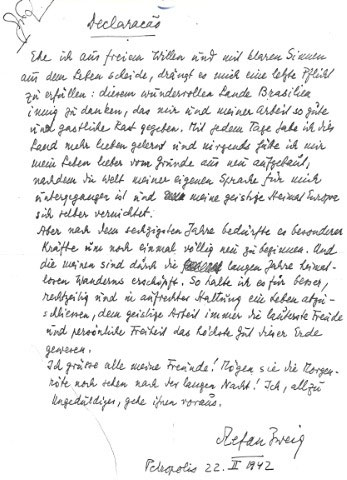Having escaped the horrors of the war in Europe, Zweig and his wife looked for a refuge where they could resume their lives. Disappointed with London and New-York, they had hoped to make a fresh start in Brazil. However, being constantly on the run, the encounter with multitudes of Jewish refugees like him, and the feeling that his cultural world was lost, filled him with great despair. He could not find the strength to begin a new life.
Zweig's suicide was criticized by many. But he was not the only one: two other Jewish intellectuals who were war refugees, the author Ernest Toller in New-York, and the philosopher Walter Benjamin in Portbou, had committed suicide before him.
Zweig's suicide letter, written in German, was found by local police officers. They called in Fritz Weil, a German-Jewish manufacturer from Petropolis, to help them translate the letter to Portuguese. Having provided them with a translation of the letter, Fritz asked to purchase it, but was refused. In 1972 Weil finally managed to buy the letter from a retired police officer; in 1992 he donated the letter to the National Library of Israel in memory of his wife's parents who died in the Holocaust.
The Letter
Declaration
Of my own will and in clear mind
Every day I learned to love this country more, and I would not have asked to rebuild my life in any other place after the world of my own language sank and was lost to me and my spiritual homeland, Europe, destroyed itself.
But to start everything anew after a man’s 60th year requires special powers, and my own power has been expended after years of wandering homeless. I thus prefer to end my life at the right time, upright, as a man for whom cultural work has always been his purest happiness and personal freedom – the most precious of possessions on this earth.
I send greetings to all of my friends: May they live to see the dawn after this long night. I, who am most impatient, go before them.
Stefan Zweig, Petropolis, 22.2.1942.

